Light at the end of the tunnel in the Sahel?
Published on Thursday 27 February 2020 Back to articles
The latest issue of Menas Associates’ Sahara Focus monthly reports concentrates on how France can redress the escalating negative perceptions of its activities in the region. We believe that if this is done it is possible that the Sahel could finally begin to reverse the seemingly inevitable slide into chaos. Our current forecast for the coming months is as follows:
- The anti-French sentiment in the region could be considerably lessened if the following transpires: the return of the Malian army to Kidal is successful and does not trigger any conflict with secessionists; the Coalition for the Sahel’s forces can be seen to be pushing back successfully against the jihadists, as they did in Tillabéri on 20 February; and if President Emmanuel Macron and other French leaders show more respect to their Sahel partners.
- If the US does withdraw its forces from the Sahel it is likely to considerably weaken the international coalition’s’ military effectiveness by depriving it of intelligence, logistics and transport.
- If the Malian army is able to re-establish itself in Kidal, without generating further conflict, it will be a major step towards implementing the 2015 Algiers Peace Agreement and reducing much of the north-south political tension in the county.
- Any talks between the Mali government and the jihadists could be the first step to reducing the threat of jihadism in both Mali and the Sahel as a whole.
- The successful establishment of the headquarters of the Coalition for the Sahel in Niamey — especially if it is accompanied by more successful operations against jihadists, like that of 20 February in Tillabéri — could see the geopolitical centre of gravity in the Sahel shifting from Bamako to Niamey.
- If Chad’s long-delayed scheduled legislative elections do go ahead in December this could — especially if they coincide with probable social unrest and further rebel incursions from Libya or elsewhere — become a serious threat to President Idriss Déby Itno’s grip on power,
- Mauritania’s six-month political transition from former president Mohamed Ould Abdel Aziz’s authoritarian and corrupt regime to that of President Mohamed Ghazouani is beginning to show signs of taking Mauritania into an unprecedented period of positive economic development and political stability.
- By contrast, unless the security situation in northern and eastern Burkina Faso is reversed very soon, the country is in line to become Africa’s next ‘failed state’.
This excerpt is taken from Sahara Focus, our monthly intelligence report on the Sahara region. Click here to receive a free sample copy.



